The average cost of Stroke Treatment in London approximately starts from USD 30000
Treatment cost
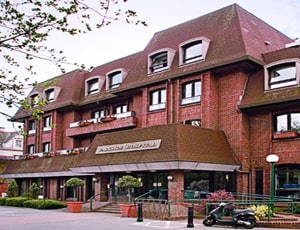
Apart from in-detail treatment procedures available, Parkside Private Hospital located in London, United Kingdom has a wide variety of facilities available for International Patients. Some of the facilities which are provided by them are Accommodation, Airport Transfer, Choice of Meals, Interpreter, SIM, TV inside room. Also listed below are some of the most prominent infrastructural details:
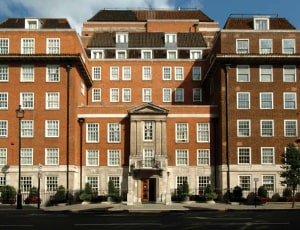
We, The London Clinic family, take pride in our reputation as a multi-disciplined healthcare facility. With skilled nurses and expert consultants, our medical teams are always focused to deliver the best individualized medical care. More than 1,000 nursing, clinical, and support staff are currently working with us to give our patients an extensive range of treatments. We use cutting-edge technologies to ensure a comprehensive range of healthcare services. Not only that, in order to make your stay with us comfortable enough, we equip our patient bedrooms with:
Patients from all over the world fly to us to get their procedures done by our specialist doctors, which is why we also provide our patient's concierge services. Our concierge services include:
The London Clinic has a zero-tolerance policy when it comes to hygiene and cleanliness. Our dedicated housekeeping team cleans every room every day between 8.00 am and 5.00 pm. They are also entitled to supply fresh towels every day and clean the rooms properly between patients.
We also have a day surgery unit based on the third floor at 20 Devonshire Place to make sure a hassle-free surgery as well as post-surgery care for our patients. Our cancer care unit at 22 Devonshire Place is also among our key services.
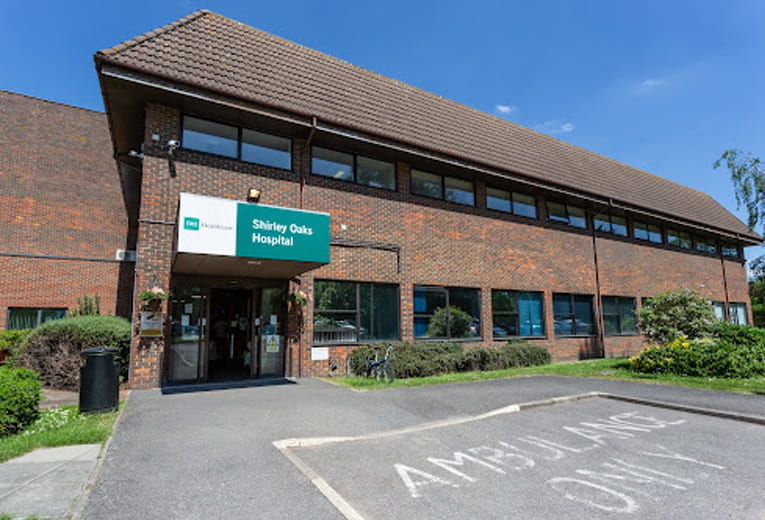
Shirley Oaks Hospital is a multispeciality hospital established in 1986 and is part of Circle Health Group. The hospital is located on the outskirts of Croydon in Shirley Oaks Village. The hospital offers a wide range of diagnostic and treatment services to patients allowing them to choose the services that they wish to avail in a hassle-free manner.
The hospital is a multispecialty facility that offers all types of treatments from 15+ specialties, including general medicine, ophthalmology, gastroenterology, and dermatology. Shirley Oaks Hospital is associated with 80+ consultants from within the UK.
The hospital offers services and treatments to patients under the age of 18 years and above.
Shirley Oaks Hospital offers a very warm and comfortable environment to the patients, from the moment they enter the building, whether for consultation or inpatient stay.

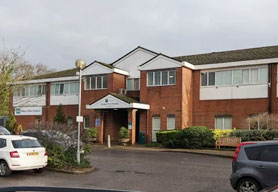
Bishops Wood Hospital is a 42 bedded acute care unit located in Middlesex, UK. Offering treatment and diagnostic services for more than 25 specialties, the hospital was established to offer the highest standard of care and services to patients from across the world. The hospital is a part of the private Circle Healthcare Group, which is a leading provider of state-of-the-art healthcare services and has multiple hospitals and clinics across the world.
The hospital has over 120 specialists and surgeons working with them to provide a variety of surgical and non-surgical treatments to people. The hospital is particularly known for a variety of orthopedic procedures that are carried out, including knee and hip surgery, hand and wrist surgery, foot and ankle surgery, and shoulder and elbow surgery. The hospital has been instrumental in slowly expanding its medical service and now offers treatments to patients requiring primary, secondary as well as tertiary care.
The hospital boasts of its team of medical and nursing staff, which is available 24 hours a day. Every medical specialist is a part of a multidisciplinary team, which includes specialists from the in-house radiology and physiotherapy department.
Facilities Provided:
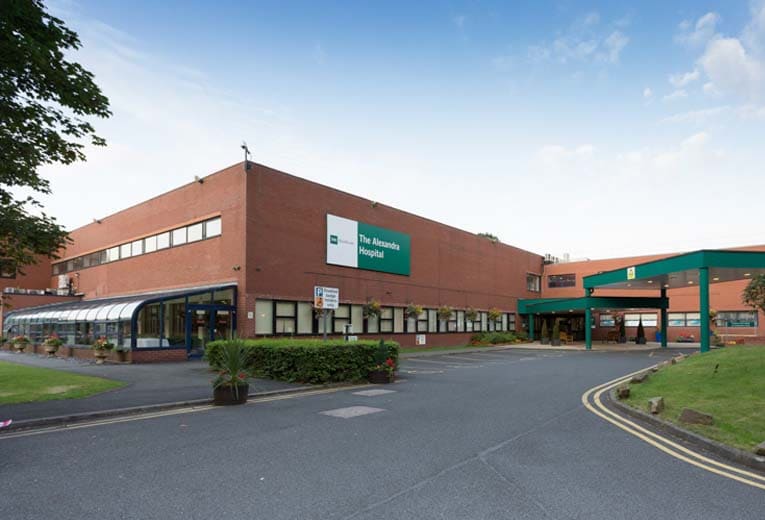
The Alexandra Hospital has access to modern equipment and private facilities for patients in Manchester, Stockport, and Cheshire. The hospital offers Outpatient Services to children from 0-18 years and day-case inpatient procedures for 3-18 years.
Established in 1981, the hospital is a 128-bedded facility offering treatments in more than 20+ specialties. The hospital has a friendly and caring staff. Equipped with world-class technology, the hospital is known for safe and effective outcomes across a wide range of treatments-from complex cases to minor surgery.
The Alexandra Hospital has dedicated radio imaging and biochemistry departments offering a wide range of tests being performed like X-ray, Ultrasound, CT Scan, MRI, DEXA Scan, etc.
The hospital ensures patient safety and provides an ideal environment with trained and experienced staff and a resident team available for 24 hours.
The hospital has efficient patient care that works hard to make each patient's time as pleasant as possible.
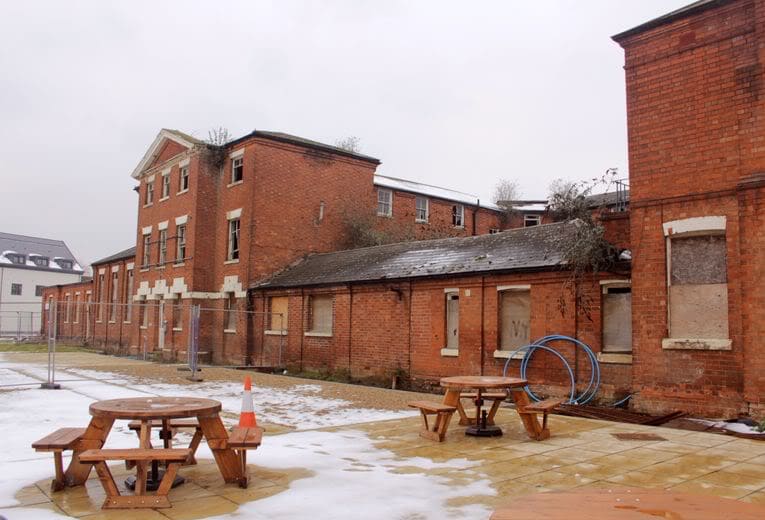
St Edmund Hospital has 26 beds with all rooms offering the privacy and comfort of en-suite facilities, views of the gardens, TV, and high-speed Wi-Fi. The hospital has three functional Operation Theatre for minor or major surgeries
The hospital has an imaging department and physiotherapy team based at the hospital to ensure the best care before and after treatment. The Hospital has a dedicated day case recovery area where patients can relax after day case procedure until discharged from the hospital.
Room service is provided to all inpatients by our catering team. All dietary needs can be catered for at the hospital.
The hospital has car parking spaces around the grounds, with a drop-off bay and disabled spaces directly opposite the entrance to the main hospital entrance.
The hospital has all the needed facilities, the latest in technology, and on-site support services; The hospital offers a wide range of procedures from routine investigations to complex surgery.
St Edmunds Hospital has more than 50 consultants who are experts and are s supported by caring and professional staff, dedicated nursing teams, and Resident Medical Officers on duty 24 hours a day, providing care within a friendly and comfortable environment.
A stroke is a serious medical emergency. It's essential to seek medical help immediately. Getting prompt emergency assistance can minimize potential brain damage and complications associated with a stroke.
It is a loss of neurological function caused by a sudden interruption of continuous blood supply to the brain. Blood flow can be disrupted by a blockage, which causes ischemic stroke, or with bleeding in the brain, which causes hemorrhagic stroke, which is more fatal. Ischemic stroke accounts for the majority of strokes. Strokes frequently strike without warning, and the consequences may be catastrophic. Normal blood flow and oxygen to the brain must be restored as quickly as possible. The afflicted brain cells are either injured or die within minutes of being deprived of oxygen and essential nutrients. When brain cells die, they usually do not recover, causing severe damage that can lead to physical, cognitive, and mental problems.
Hemorrhagic Stroke: Emergency treatment for a hemorrhagic stroke focuses on managing bleeding and alleviating brain pressure from excess fluid. Here's how it's typically approached:
Ask your healthcare adviser for the best multiple options and choose the one that meets your expectations
The average cost of Stroke Treatment in London starts from $30000. Stroke Treatment in London is available across many hospitals in different states.
Different hospitals have different pricing policy when it comes to the cost of Stroke Treatment in London. The top hospitals for Stroke Treatment in London covers all the expenses related to the pre-surgery investigations of the candidate. The Stroke Treatment package in London includes the fees of the surgeon, hospitalization and anesthesia as well. Stay outside the package duration, port-operative complications and diagnosis of a new condition may further increase the Stroke Treatment cost in London.
There are several best hospitals for Stroke Treatment in London. Some of the most renowned hospitals for Stroke Treatment in London include the following:
The recovery of the patient many vary, depending on several factors. However, on an average, patient is supposed to stay for about 11 days in the country after discharge. This period is important to conduct all the follow-up tests to ensure that the surgery was successful and the patient can go back to the home country.
London is undoubtedly one of the best cities for Stroke Treatment in the world. It offers the best medical expertise and good patient experience at an affordable cost. Some of the other destinations that are popular for Stroke Treatment include the following:
Apart from the Stroke Treatment cost, there are a few other daily charges that the patient may have to pay. These are the charges for daily meals and accommodation outside the hospital. The per day cost in this case may range from 55 USD.
There are several doctors who are available for telemedicine consultation for patients requiring Stroke Treatment in London. Some of the surgeons offering this service include the following:
Some of the most sought after doctors available for online video consultation for Stroke Treatment in London are:
| Doctor Name | Cost | Book Appointment |
|---|---|---|
| Dr. Mohamed Abdalla | 250 | Book Now |
The patient is supposed to stay at the hospital for about 3 Days after Stroke Treatment surgery for monitoring and care. The doctors team review the patient's recovery during this time with the help of blood tests and imaging scans. Once they feel that everything is on track, the patient is discharged.
There are more than 3 Hospitals that offer Stroke Treatment in London. These hospitals have the required infrastructure and a decided Stroke Treatment unit where renal failure patients can be treated. Such hospitals follow all legal protocols and guidelines as specified by the local medical affairs body when it comes to the treatment of international patients.
Some of the most sought after doctors for Stroke Treatment in London are: